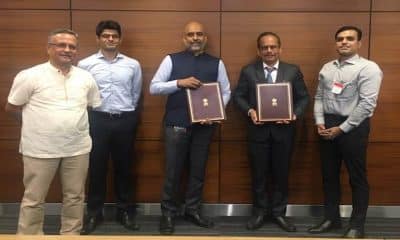News
CAG Report Highlights Urgent Need for Overhaul in Indian Railways’ Healthcare Services
The Comptroller and Auditor General (CAG) of India has released a report that casts a harsh light on the state of healthcare services within Indian Railways. The findings are a stark reminder of the challenges faced by the healthcare system, particularly within the hospitals and health units under the Railway’s purview. The audit, focusing on the period between 2017-18 and 2021-22, reveals significant deficiencies in medical staffing, equipment availability, and overall healthcare management, raising critical concerns about the adequacy of services provided to nearly one crore railway beneficiaries.
Staff Shortages and Equipment Deficits
One of the most pressing issues highlighted by the CAG is the severe shortage of medical and paramedical staff in zonal railway hospitals. This staffing shortfall directly impacts the quality and accessibility of healthcare services for railway employees and their families. The report also points out a troubling lack of essential medical equipment, with many hospitals failing to meet even the minimum standards set by the Indian Public Health Standards (IPHS) and the Clinical Establishment (Registration and Regulation) Act of 2010.
The lack of proper medical equipment not only compromises patient care but also places additional strain on existing resources. In an era where technological advancements in healthcare are critical, such gaps in infrastructure can lead to delays in diagnosis and treatment, adversely affecting patient outcomes.
Also read: CAG Report Exposes Financial Mismanagement in Indian Railways: A Deep Dive into Rs 2,604 Crore Losses
Rising Costs of Referrals and Unchecked Expenditure
The report also draws attention to the substantial costs incurred by the Railways due to referrals of patients to non-railway recognized hospitals. In the period reviewed, a staggering 98.72% of these cases were not subject to medical audits, leaving a significant portion of expenditure unchecked and unaccounted for. This lack of oversight not only contributes to rising healthcare costs but also raises questions about the efficacy and necessity of such referrals.
The trend of increasing expenditure on healthcare services within the Railways, juxtaposed with a sharp drop in 2021-22, suggests inconsistencies in budget allocation and resource management. The absence of a robust internal control mechanism further exacerbates these issues, leading to inefficiencies and potential wastage of resources.
Gaps in Ayushman Bharat Implementation and Bed Occupancy Rates
Another critical area of concern is the partial implementation of the Ayushman Bharat Yojana in railway hospitals. This government-backed health scheme is designed to provide comprehensive care to millions of Indians, yet its incomplete adoption within the Railway’s healthcare system leaves a large number of beneficiaries without access to essential services.
Moreover, the Bed Occupancy Ratio (BOR), a key indicator of hospital productivity, was found to be below standard norms in many railway hospitals. A low BOR often indicates underutilization of hospital resources, which can lead to higher per-patient costs and reduced efficiency of healthcare delivery.
The Way Forward: Strengthening Oversight and Infrastructure
The CAG’s report does more than just highlight the deficiencies; it also offers a roadmap for reform. The recommendations call for a comprehensive review of existing resources and infrastructure within railway hospitals to ensure they meet the required standards. This includes regular assessments of staffing needs, equipment availability, and overall service delivery to bridge the gaps between prescribed standards and current practices.
The report also emphasizes the need for better monitoring and internal control mechanisms, particularly in conducting medical audits and ensuring the timely procurement of quality drugs and equipment. Implementing a Hospital Management Information System (HMIS) is suggested as a critical step towards improving efficiency and transparency in hospital operations.
The findings of the CAG’s report serve as a crucial wake-up call for Indian Railways. The healthcare services provided to railway employees and their families are a vital component of the Railways’ social responsibility, and the current state of these services is far from satisfactory. Immediate and concerted efforts are needed to address the identified gaps and ensure that the healthcare needs of railway beneficiaries are met with the highest standards of care and efficiency.
As the Railways move forward, the lessons from this report should guide policy decisions and resource allocation, ensuring that the healthcare system within the Railways is robust, efficient, and capable of meeting the challenges of the future.












































